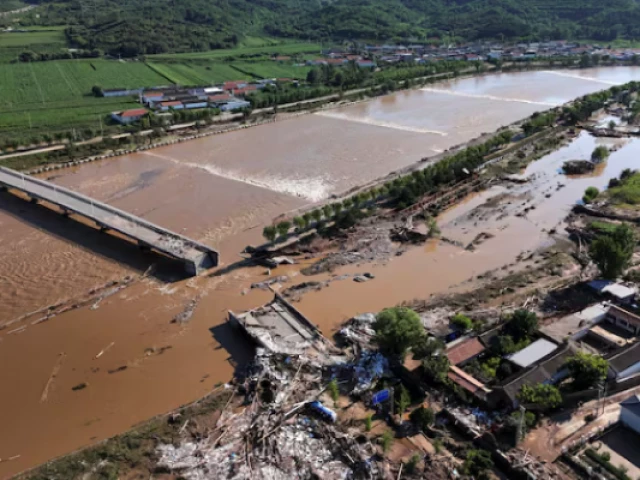Beijing admits lack of preparedness as rains kill 60
Rains and floods in northern China have displaced tens of thousands since last week

Beijing city officials admitted on Thursday they had not been prepared for heavy rains that soaked swathes of the capital, killing 60 people and leaving nine still missing.
Extreme rains and flooding across northern China have killed 60 people, more than half of them at a care home for the elderly in a suburb of Beijing, which has grappled with its deadliest flood disaster in years.
In Beijing, 44 people died over the past week, the city's deputy mayor Xia Linmao said at a press conference on Thursday. At least 31 others were missing in the capital and neighbouring Hebei province, authorities said.
Parts of northern China endured deadly rains and floods since last week that forced the evacuation of tens of thousands.
The capital's rural suburbs were hardest hit, officials said, raising the toll from the previously reported 30 announced on Tuesday.
"As of midday on July 31, some 44 people have died and nine are still missing as a result of the disasters across the whole of Beijing," top city official Xia Linmao told a news conference.
Read More:Extreme weather kills 30 in Beijing as year's rain falls in a week
"Between July 23 and 29, Beijing suffered extreme rainfall," he said, adding they had caused "significant casualties and (other) losses".
Out of those deaths, 31 took place at an "elderly care centre" in the town of Taishitun in the northeast of the city, Xia said.
Among those still missing are local officials working on search and rescue, he added.
"On behalf of the municipal party committee and the city government, I would like to express deep mourning for those who have regrettably lost their lives, and profound condolences to their relatives," he said.
Xia vowed to "learn profound lessons" from the disaster.
"Our ability to forecast and warn of extreme weather is insufficient, and disaster prevention and mitigation plans have not been fully developed," he said.
"There are still shortcomings in the construction of infrastructure in mountainous areas," Xia said.
Yu Weiguo, ruling Communist Party boss in the hard-hit Miyun district, also admitted there had been "gaps" in readiness.
"Our knowledge of extreme weather was lacking. This tragic lesson has warned us that putting the people first, putting human life first, is more than a slogan," he said.
"After reflecting on this painful experience, we must always tightly grasp the string of safety," Yu added.
Also Read:Heavy rainfall disrupts daily life in twin cities
Dozens of roads have been closed, villages lost electricity, and homes were submerged due to the rainstorms across Beijing and its neighbouring provinces.
Speaking to AFP, villagers in hard-hit areas described being taken by surprise by rushing water that quickly subsumed their homes.
"I've never seen this before, in all my 40 years of life. Neither have those who've lived 80 or 90 years," villager Hu Yuefang in the northern Beijing district of Huairou said.
Natural disasters are common across China, particularly in the summer when some regions experience heavy rain while others bake in searing heat.
China is the world's biggest emitter of the greenhouse gases that drive climate change and contribute to making extreme weather more frequent and intense.
But it is also a global renewable energy powerhouse that aims to make its massive economy carbon-neutral by 2060.


















COMMENTS
Comments are moderated and generally will be posted if they are on-topic and not abusive.
For more information, please see our Comments FAQ